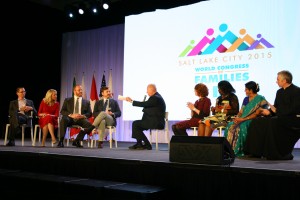
A group of pro-family opinion leaders shared their views on how individual citizens can help fight attacks on families and the dignity of human beings during a group discussion on Tuesday at the World Congress of Families.
Rod Arquette a radio talk show host for KNRS, opened the discussion featuring eight pro-family leaders. They described the need for individuals to organize against the societal shift away from marriage and traditional families, noting that societal changes by those seeking affirmation for alternate lifestyles only occur when advocates organize themselves.
Arquette opened the discussion by quoting G. K. Chesterson:
“‘Assaults on religion, attacks on the family, and attacks on the dignity of a human being are part of the everyday life’,” said Arquette. “How can we make a difference in the world today?”
Showing support for traditional marriage through social media, being an example of what love looks like and keeping a vision of what is possible in the progression of natural marriage were some of the suggestions given by panelists.
A medical doctor from the Center for Medical Integrity in Intimacy Education, Miriam Grossman, stressed the importance of each individual’s impact. When the movie “50 Shades of Grey” was released Grossman, published a blog that urged people not to see the film.
“It’s a very disturbed movie about abuse and mental sickness,” Grossman said.
Grossman’s blog reached people in Nigeria and created a change she had not considered possible. Theresa Okafor, director of the Quality Assurance and Research Development Agency in Nigeria, spoke of how Grossman’s blog affected the people of Nigeria.
“The people of Africa consider the family, love, and human sexuality as divine and were quick to notify their government of the danger and the perverseness found in ’50 Shades of Grey.’ An outright ban was placed on that movie and it will never be shown publicly in Nigeria,” Okafor said.
Grossman used her success online to encourage other individuals to do the same and take action in their support of traditional marriage.
Western culture and media influences traditional marriages in other countries, panelists said.
Okafor referred to the early days of Africa when missionaries came and taught correct and humanized principles, but says those teachings have changed. Okafor said what used to be taught as savage practices in regard to human sexuality are now widely accepted and practiced.
“The same messages brought from western culture that taught against pagan and perverse practices have now changed to promote such practices,” Okafor said.
Suja Koshy is an associate professor and head of the department of human development at S.V.T College, SNDT Women’s University in Mumbai, India. She said western culture has also enticed Indian women to seek education before marriage.
“More emphasis is placed on education. Marriage is still something that young people look forward to, but after education,” Koshy said.
Panelists said although traditional marriages are still occurring, they acknowledge a barrier between men and women. Arquette articulated a barrier as a digression from natural respect for the roles and development inherent in each gender.
“Today we live in a world where girls become women and men become boys,” Arquette said.
Many panelists agreed that traditional marriages need to exhibit “old-fashioned” chivalry and function as an example for children of how love should be lived.
Jaroslaw Szymcsak a member of the Secular Institute of Consecrated Life of the Holy Family in Lomianki, Poland, said successful marriages are rooted in respect.
“Men used to shake hands and bow to kiss the hand of women in a show of huge respect. Why? Because she is a woman and that is enough,” Szymcsak said.




